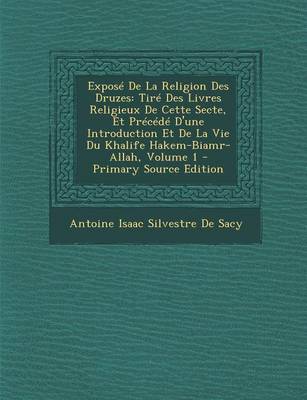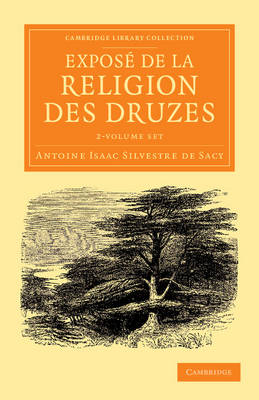Cambridge Library Collection - Perspectives from the Royal Asiatic Society
1 primary work • 4 total works
Volume 2
Antoine Isaac Silvestre de Sacy (1758-1838), the most distinguished French orientalist of his time, is considered the father of Arab scholarship in Europe. He had a lifelong interest in a little-known religious community, the Druze, which emerged in the eleventh century as an Ismaili schismatic movement. De Sacy's monumental study was begun in the 1790s, when he translated some of the Druze scriptures from Arabic to French. Such was his commitment to learning more about the Druze that he waited forty years before publishing this two-volume work in 1838, as he hoped to uncover further source material. It offers pioneering insight into the religious system founded by Hamza ibn-'Ali ibn-Ahmad during the reign of the caliph al-Hakim bi-Amr Allah. Volume 2 thoroughly examines the Druze hierarchical structures and doctrines, from moral duties to civil law.
Expose de la religion des Druzes 2 Volume Set
by Antoine Isaac Silvestre De Sacy
Published 28 February 2013
Antoine Isaac Silvestre de Sacy (1758-1838), the most distinguished French orientalist of his time, is considered the father of Arab scholarship in Europe. He had a lifelong interest in a little-known religious community, the Druze, which emerged in the eleventh century as an Ismaili schismatic movement. De Sacy's monumental study was begun in the 1790s, when he translated some of the Druze scriptures from Arabic to French. Such was his commitment to learning more about the Druze that he waited forty years before publishing this two-volume work in 1838, as he hoped to uncover further source material. It offers pioneering insight into the religious system founded by Hamza ibn-'Ali ibn-Ahmad during the reign of the caliph al-Hakim bi-Amr Allah. Volume 1 looks at the early history and doctrines of the Ismaili movement. Volume 2 examines the Druze hierarchical structures and internal characteristics, from moral duties to civil law.
Expose de la religion des Druzes: Volume 1
by Antoine Isaac Silvestre De Sacy
Published 5 April 2014
Antoine Isaac Silvestre de Sacy (1758-1838), the most distinguished French orientalist of his time, is considered the father of Arab scholarship in Europe. He had a lifelong interest in a little-known religious community, the Druze, which emerged in the eleventh century as an Ismaili schismatic movement. De Sacy's monumental study was begun in the 1790s, when he translated some of the Druze scriptures from Arabic to French. Such was his commitment to learning more about the Druze that he waited forty years before publishing this two-volume work in 1838, as he hoped to uncover further source material. It offers pioneering insight into the religious system founded by Hamza ibn-'Ali ibn-Ahmad during the reign of the caliph al-Hakim bi-Amr Allah. Volume 1 looks at the early history and doctrines of the Ismaili movement before expanding on the reign of al-Hakim (996-1021).
Expose de la religion des Druzes: Volume 2
by Antoine Isaac Silvestre De Sacy
Published 5 April 2014
Antoine Isaac Silvestre de Sacy (1758-1838), the most distinguished French orientalist of his time, is considered the father of Arab scholarship in Europe. He had a lifelong interest in a little-known religious community, the Druze, which emerged in the eleventh century as an Ismaili schismatic movement. De Sacy's monumental study was begun in the 1790s, when he translated some of the Druze scriptures from Arabic to French. Such was his commitment to learning more about the Druze that he waited forty years before publishing this two-volume work in 1838, as he hoped to uncover further source material. It offers pioneering insight into the religious system founded by Hamza ibn-'Ali ibn-Ahmad during the reign of the caliph al-Hakim bi-Amr Allah. Volume 2 thoroughly examines the Druze hierarchical structures and doctrines, from moral duties to civil law.


